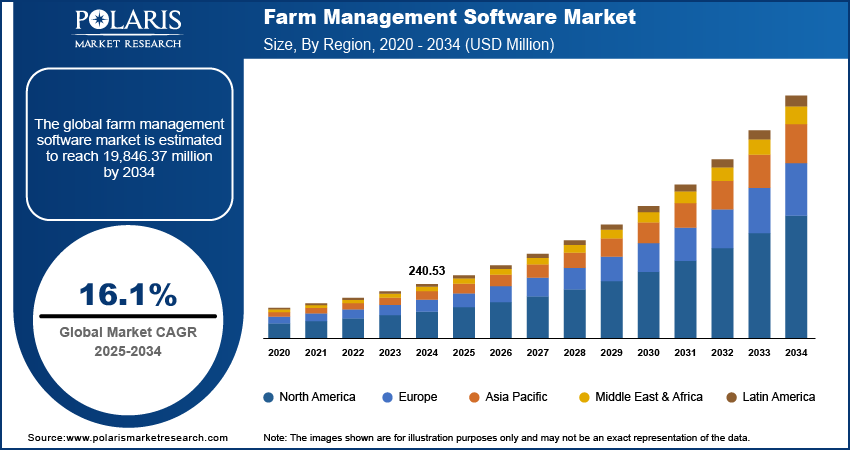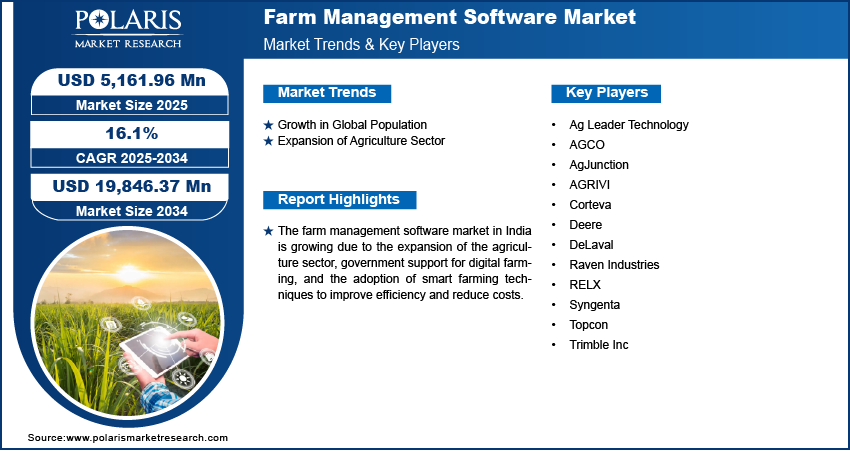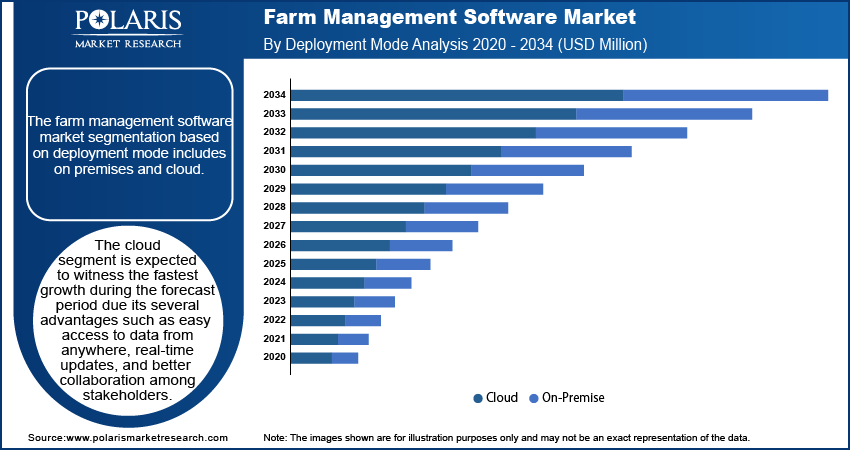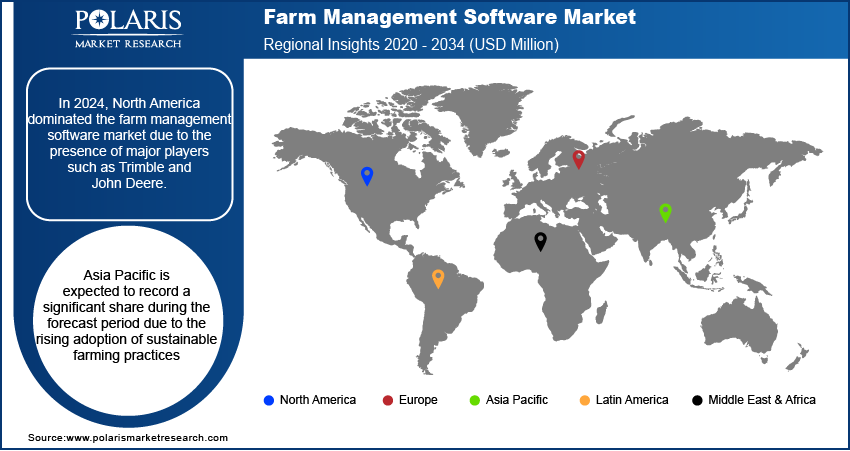
Farm Management Software Market Share, Size, Trends, Industry Analysis Report, By Agriculture Type (Precision Farming, Livestock Monitoring, Smart Greenhouse, Fish Farming); By Deployment Mode; By Service; By Region; Segment Forecast, 2024 - 2032
- Published Date:Jan-2024
- Pages: 114
- Format: PDF
- Report ID: PM3516
- Base Year: 2023
- Historical Data: 2019-2022
Report Outlook
The global farm management software market was valued at USD 3.09 billion in 2023 and is expected to grow at a CAGR of 10.90 % during the forecast period. The farm management software market has witnessed significant growth in recent years, driven by the increasing adoption of digital technologies in agriculture. Farm management software is computer-based applications and platforms that help farmers and agribusinesses manage and optimize their operations.

To Understand More About this Research: Request a Free Sample Report
The driver of the market is the growing need for efficient farm management practices. Farmers seek digital solutions to streamline their operations and improve productivity as modern agriculture becomes more complex and technologically advanced. Farm management software offers features such as crop planning, field mapping, irrigation management, livestock management, and financial tracking, which enable farmers to make data-driven decisions and optimize their resources.
The research report offers a quantitative and qualitative analysis of the farm management software market to enable effective decision-making. It covers the key trends and growth opportunities anticipated to have a favorable impact on the market. Besides, the study covers segment and regional revenue forecasts for market assessment.
Furthermore, the need for improved traceability and regulatory compliance has also fueled farm management software adoption. These software solutions provide tools for record-keeping and documentation, ensuring that farmers can meet the requirements of food safety regulations and certifications. Additionally, farm management software enables better inventory management and supply chain visibility, facilitating the traceability of agricultural products from farm to fork.
The increasing focus on sustainability and environmental stewardship has also contributed to the growth of the Farm Management Software Market. These software solutions can help farmers optimize their water use, fertilizers, and pesticides, reducing waste and minimizing environmental impact. Moreover, farm management software can assist in monitoring and mitigating risks related to weather conditions, pests, and diseases, thereby improving crop yields and resilience.

Industry Dynamics
Growth Drivers
The growing upstream food technology sector, which includes precision agriculture, robotics, and artificial intelligence, is driving the growth of the market. Farmers are adopting these technologies to improve their agricultural practices, increase productivity, and reduce costs. Farm management software is crucial to help farmers manage these technologies effectively. The growing upstream food technology sector is driving the need for sophisticated farm management software to help farmers manage these technologies effectively
The increasing adoption of smartphones and tablets makes it easier for farmers to access and use farm management software solutions, as they can be accessed anywhere and anytime. This trend is expected to continue as the use of mobile devices becomes more widespread, and farmers become more comfortable with using technology to manage their operations.
Report Segmentation
The market is primarily segmented based on agriculture type, deployment mode, service, and region.
|
By Agriculture Type |
By Deployment Mode |
By Service |
By Region |
|
|
|
|
To Understand the Scope of this Report: Speak to Analyst
The Precision Farming Segment is Expected to Witness the Fastest Growth over the Projected Period
The precision farming segment is projected to experience faster growth in the forecast period. It involves using technologies such as GPS, sensors, drones, & ML to optimize yields, reduce waste, & can easily increase profitability. Farm management software plays a crucial role in enabling precision farming by collecting and analyzing data from precision farming technologies, such as soil sensors, weather predictors, & crop health sensors, where farmers can make more informed decisions about planting, fertilization, irrigation, & harvesting.
Furthermore, farm management software can help farmers to optimize their use of resources, such as water and fertilizer, by providing insights into the most effective and efficient ways to apply these inputs. This can lead to cost savings and more sustainable farming practices. Moreover, precision farming software can integrate with other technologies, such as farm machinery, GPS equipment, and automated irrigation systems, to comprehensively view a farm's operations. This integration can help farmers to optimize their workflows, reduce manual labor, and improve overall farm efficiency.
The Cloud-Based Segment is Projected to Witness the Largest Market Share in the Forecast Period
Cloud-based deployment mode is driving the growth of the market as it offers lower upfront costs compared to on-premise software. Farmers can avoid the significant expense of buying and maintaining their own hardware and software infrastructure, which can be a significant financial burden for many small and medium-sized farms. Instead, they can access the software through a subscription-based model and pay only for what they need. This allows for easier scalability.
Farmers can quickly add or remove users or features as needed without significant investment in infrastructure or hardware. This allows farms of all sizes to scale their operations quickly and efficiently. It provides improved accessibility. Farmers can access their farm management software from anywhere with an internet connection, using any device. This allows farmers to work from the field, the office, or even home, improving their productivity and efficiency. These factors will drive the growth of the market in the upcoming years.
System Integration and Consulting Segment is Expected to Hold a Significant Revenue Share over the Projected Period
The system integration and consulting segment is driving the growth of the market as it can help farmers to identify and select the most appropriate farm management software solutions for their needs. As many different types of farm management software are available on the market, choosing the right solution can be daunting for farmers. Consulting services can help farmers navigate this complexity and make informed decisions based on their needs.
This can help farmers customize their farm management software to meet their needs. While many farm management software solutions are highly configurable, some farmers may require additional customization to meet their unique requirements. Consulting services can help farmers make these customizations and ensure their software solution is tailored to their specific needs. This will further fuel the growth of the market in the coming years.

North America is Expected to Have a Larger Revenue Share in 2022
North America is expected to have a larger market revenue share. It has a well-developed agricultural sector with high adoption of new technologies and solutions to improve efficiency and productivity. North American farmers have quickly adopted farm management software solutions, recognizing the benefits of these tools for optimizing their operations, increasing yields, and reducing waste. As a result, the region has a large and growing market for farm management software solutions.
Adopting advanced agriculture technology in Japan has driven the need for sophisticated farm management software to help farmers manage these technologies effectively. According to the study by Nanseki (2021), around 85.5 percent of agricultural firms have implemented financial systems, such as for farming management & accounting-related database maintenance in Japan. As a result, Japan’s market is expected to continue to grow in the coming years, driving the growth.
Asia Pacific is expected to have a higher growth rate for the market as the region has a large and growing agricultural sector with high adoption of precision farming technologies. The adoption of precision farming techniques such as variable rate technology, remote sensing, and data analytics is increasing rapidly in the region as farmers seek to optimize yields, reduce waste, and improve profitability.
Farm management software is a natural extension of these techniques, allowing farmers to manage their operations more efficiently and effectively. According to Inc42, the Indian agricultural sector will increase in size to a value of US$24 billion by 2025. The growing agriculture sector in developing nations like India, coupled with the increasing adoption of technology and the availability of smartphones and the internet, is driving the growth.

Competitive Insight
Some of the major players operating in the global market include Ag Leader Technology, AGCO, AgJunction, AGRIVI, Corteva, Deere, DeLaval, Microsoft, Raven Industries, RELX, Syngenta, Climate, Topcon, and Trimble.
Recent Developments
- In April 2023, Bosch BASF Smart Farming & AGCO Corporation collaborated to integrate “Smart Spraying” technology on the Fendt Rogator sprayers to develop new features.
- In January 2023, Precision Planting introduced new software, “Panorama”, to assist farmers to use its information into the company's 20|20 monitors. Farmers can transfer data gathered by their Precision Planting tools to the platform of their choice using the new Panorama offering.
Farm Management Software Market Report Scope
|
Report Attributes |
Details |
|
Market size value in 2024 |
USD 3.42 billion |
|
Revenue forecast in 2032 |
USD 7.84 billion |
|
CAGR |
10.90% from 2024 - 2032 |
|
Base year |
2023 |
|
Historical data |
2019 - 2022 |
|
Forecast period |
2024 - 2032 |
|
Quantitative units |
Revenue in USD billion and CAGR from 2024 to 2032 |
|
Segments covered |
By Agriculture Type, By Deployment Mode, By Service, By Region |
|
Regional scope |
North America, Europe, Asia Pacific, Latin America, Middle East & Africa |
|
Key companies |
Ag Leader Technology, AGCO, AgJunction, AGRIVI, Corteva, Deere, DeLaval, Microsoft, Raven Industries, RELX, Syngenta, Climate, Topcon, and Trimble. |
The analysis of farm management software market extends to a comprehensive market forecast up to 2032, coupled with a retrospective examination. Avail yourself of a complimentary PDF download to sample this in-depth industry analysis.
FAQ's
The Farm Management Software Market report covering key are agriculture type, deployment mode, service, and region.
Farm Management Software Market Size Worth 7.84 Billion By 2032.
The global farm management software market expected to grow at a CAGR of 10.9% during the forecast period.
North America is Farm Management Software Market.
key driving factors in Farm Management Software Market Requirements of high initial capital investment.
